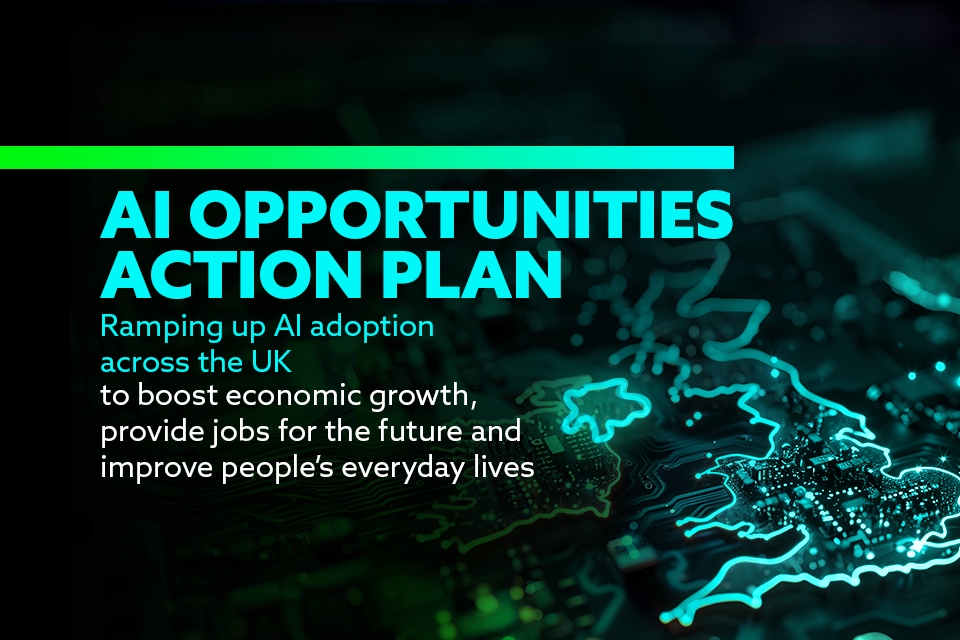AI for Public Good: The UK Government’s AI Playbook
The UK government took a significant step forward this week in shaping the responsible and effective use of artificial intelligence by publishing the AI Playbook for the UK Government. Developed by the Government Digital Service (GDS) in collaboration with multiple government departments, industry, and academic institutions, the Playbook provides a clear, practical framework for how AI should be deployed across the UK’s public sector.
It builds upon the Generative AI Framework for HMG and expands its scope to cover all forms of AI technologies, ensuring that government departments have the necessary guidance to use AI in a lawful, ethical, and secure manner.
This document arrives at a time when AI’s potential to transform public services is widely recognised. From streamlining operations and enhancing decision-making to improving efficiency and reducing costs, AI has already begun reshaping how governments function. However, with these opportunities come risks—bias, security vulnerabilities, accountability, and ethical considerations—which the Playbook directly addresses.
Between 2016 and 2019, I spent three years working in the Digital, Data and Technology (DDaT) directorate within the UK Government’s then Department for International Trade as DDaT’s Head of Communications and Engagement.
During these three years, we worked together using Agile and service design methods. Skills that enabled us and our great teams to design, test and deliver digital services to support international trade.
This new AI playbook once again established a foundation for helping the government and the civil service adopt and benefit from AI, which can help deliver better services and outcomes for people and businesses across the UK.
AI as a Force for Efficiency and Innovation
AI is already demonstrating its potential to improve public service efficiency, with ThePlaybook highlighting real-world applications that illustrate how AI can enhance productivity, free up human resources and reduce administrative burdens. One such example is GOV.UK Chat, an AI-powered chatbot designed to assist people in navigating government services.
The GOV.UK Chat service uses Natural Language Processing (NLP) to help users find the information they need quickly and efficiently, reducing call centre strain and allowing government employees to focus on more complex tasks.
In another case showcased in the playbook, NHS.UK deployed an AI-driven content moderation system to efficiently handle thousands of patient reviews. This streamlined the process and reduced the costs associated with manual moderation, demonstrating AI’s ability to optimise resource allocation while maintaining accuracy and fairness. These examples highlight a key message of the Playbook: AI is a tool that, when applied correctly, can help the government do more with less.
Feryal Clark MP, Parliamentary Under-Secretary of State for AI and Digital Government, encapsulated this vision in the Playbook’s foreword:
“The potential of AI to transform public services is enormous, giving us an unparalleled opportunity to do things differently and deliver more with less.”
This statement underscores the UK government’s ambition to embrace AI while ensuring responsible oversight, setting a model for other nations.
Managing AI Risks with Governance and Transparency
Despite its benefits and the hype, AI is not without risks. The Playbook rightly so acknowledges and addresses concerns about fairness, security, accountability, and ethical implications. AI models, if not carefully designed and monitored, can perpetuate biases, make opaque decisions, or be vulnerable to cyber threats.
Let’s remember that we humans create Large Language Models (LLMs). The reliability of LLMs is shaped not just by their training data but also by how humans interact with them. Bias can enter at multiple levels—through historical, cultural, or political imbalances in training data and how users frame their questions. These biases pose risks in government policy development, corporate decision-making, and AI-driven legal or financial insights. While techniques like reinforcement learning and bias audits help mitigate some risks, human oversight must remain essential. Humans require critical thinking in order to question the output and recommendations of AI. The key to maximising AI’s value lies in balancing its efficiency with responsible use, ensuring that models serve as impartial tools rather than amplifiers of pre-existing bias.
To mitigate these risks, the Playbook establishes clear protocols for AI governance. Departments using AI are required to maintain an AI Systems Inventory, ensuring transparency in how AI is applied. Additionally, bias audits, human oversight mechanisms, and AI assurance techniques are mandated to prevent potential harm. The government has also committed to using the Algorithmic Transparency Recording Standard (ATRS), ensuring that AI’s role in decision-making remains open to public scrutiny.
David Knott, Government Chief Technology Officer at DSIT, reinforced this commitment:
“The AI Playbook will support the public sector in better understanding what AI can and cannot do, and how to mitigate the risks it brings. It will help ensure that AI technologies are deployed in responsible and beneficial ways, safeguarding the security, wellbeing, and trust of the public we serve.”
This focus on transparency and accountability will be crucial in building public confidence in AI-driven government services.
However, what will be critical and needed is the focus on establishing a culture where designers and users of AI tools within the government can test these tools. The public's adoption of AI tools relies on the trust and reputation of those delivering these AI services to the public.
Lessons for Governments, Businesses, and Public Sector Organisations
The Playbook is not just a resource for the UK government—it holds valuable lessons for businesses, start-ups, investors, and international governments looking to navigate the AI landscape.
For government departments and arms-length bodies (ALBs), it sets a precedent for ethical AI governance, offering a structured approach that balances innovation with public trust. By ensuring risk management strategies are in place, governments worldwide can follow the UK’s lead in making AI a tool for positive societal impact rather than an unchecked technological force.
For businesses and technology providers, the Playbook serves as a blueprint for engaging with the public sector. Companies developing AI solutions must align with government procurement requirements, focusing on compliance, security, and ethical AI deployment. Those who demonstrate transparency and responsible AI practices will find themselves well-positioned to secure government contracts and collaborate on AI-driven projects. The watchword I’d add is how AI can help increase productivity - a better return from taxpayer money.
For public sector organisations, AI offers significant efficiency gains, but the key takeaway is that AI must be deployed thoughtfully. The hype is that AI is for everything, when for some services, it might not be.
The Playbook encourages a “human-in-the-loop” approach, ensuring that AI augments human decision-making rather than replacing it.
A Landmark Achievement for the UK’s Digital Future
The publication of the AI Playbook for the UK Government is a milestone in the UK’s digital transformation journey. The UK has long positioned itself as a leader in AI governance, regulation, and innovation, and this Playbook solidifies that stance.
The Government Digital Service (GDS) and the Department for Science, Innovation and Technology (DSIT) have delivered a document that is both practical and visionary, equipping government bodies with the tools they need to embrace AI responsibly.
By setting clear principles, governance structures, and ethical guidelines, the UK government has ensured that AI will serve the public good—enhancing services, increasing efficiency, and driving innovation—while safeguarding security, fairness, and transparency.
As AI continues to evolve, like GDS’ Service Manual did in the last, this Playbook will act as a living document, adapting to new challenges and opportunities. For now, it stands as a foundational blueprint of responsible AI adoption—one that governments, businesses, and organisations in the UK and around the world should take note of.






